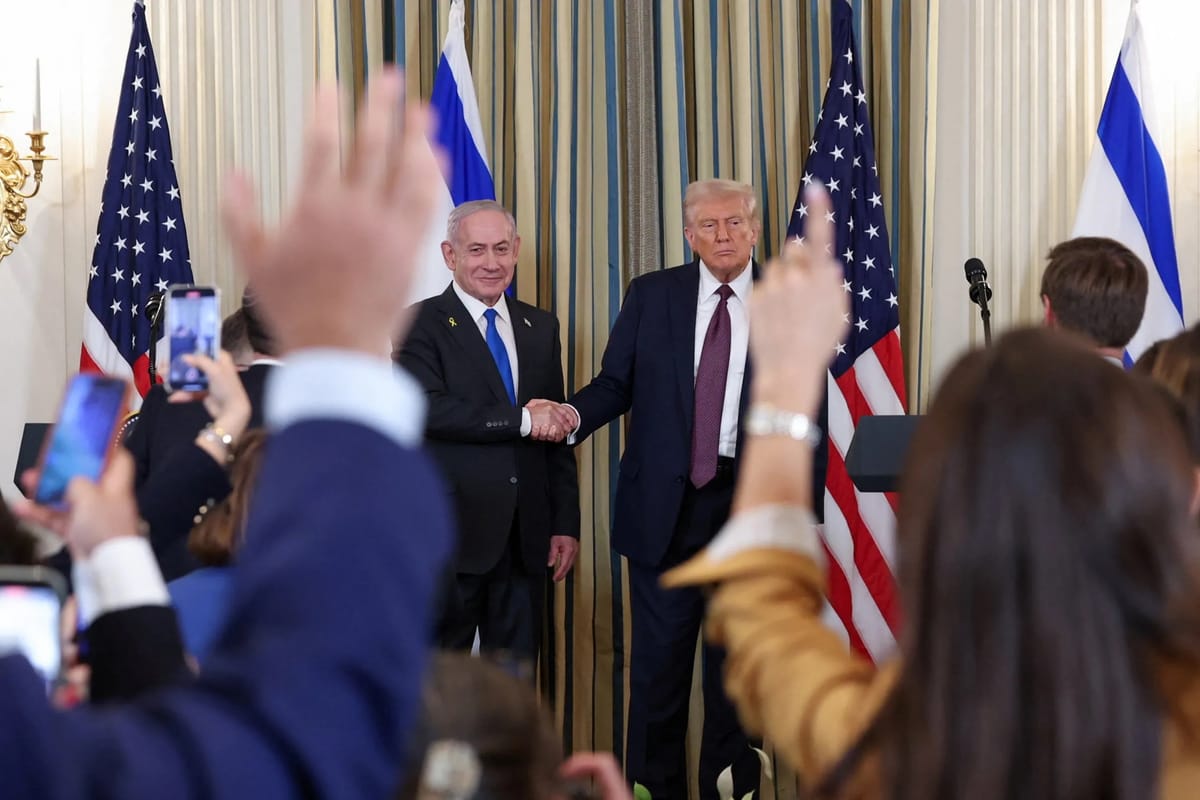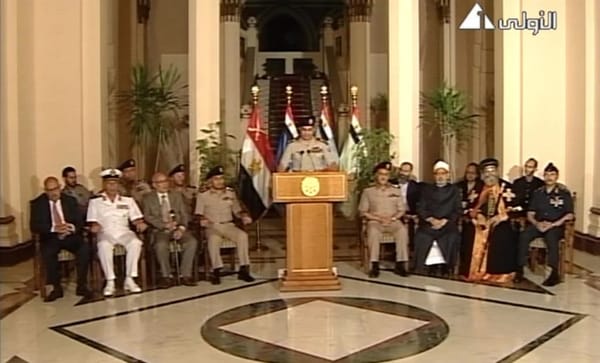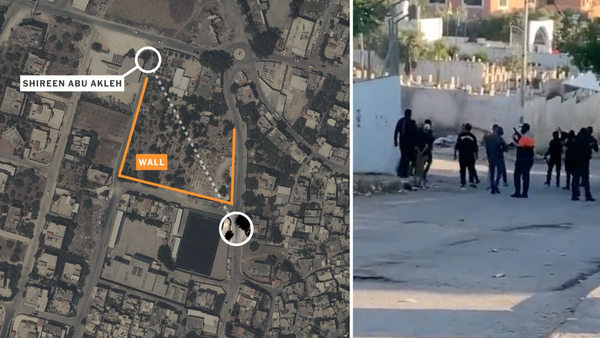Gaza's Tomorrow is Yesterday

Plus the latest from the MENA Academy
Last week, the Trump White House announced a somewhat odd 20 point peace plan for Gaza; the language was so casual and the key points so vague that I at first assumed that it was just a public summary of the real document, but apparently that is not the case. Nobody really knows what terms like "Gaza will be a deradicalised terror-free zone" or "the conditions may finally be in place for a credible pathway to Palestinian self-determination and statehood" mean, which is probably the point. The text called for the hostages to be released "within 72 hours of Israel publicly accepting this agreement", which obviously has not happened; it also called for the war to end, which has also obviously not happened.
There are some positive points in the Trump plan. It is similar to but in many ways substantially better than the ideas batted around during the Biden administration, and Trump has pushed it forward with far more public pressure and presidential peevishness than Biden ever mustered towards Israel. Most importantly, it states that if both sides accept the agreement then "the war will immediately end." There's more positives in the text: it explicitly states that Israel would not annex or occupy Gaza, that full aid (as defined by the January 2025) agreement would immediately enter Gaza, and that "no one will be forced to leave Gaza, and those who wish to leave will be free to do so and free to return." The prospect of an end to the war and resumption of aid while ruling out Israeli aspirations to annex Gaza and expel its remaining people is all to the good.
Most of the day after suggestions for Gaza seem highly aspirational and unlikely to manifest, of course. It's hard to know what to make of development plans, technocratic governments, Arab peacekeeping forces, amnesties, deradicalization, and all that. It's impossible to not shake your head and laugh sadly at the "Board of Peace" headed by Donald J Trump and featuring every Palestinian's favorite Tony Blair establishing a latter-day international mandate to rule over Gaza. The Egyptian idea of including American peacekeeping forces on the ground in Gaza – which would make any Israeli violation of the agreement an attack on Americans instead of on helpless Palestinians or hapless Arab-hatted subcontractors – would truly make a difference, so probably won't happen. But compared with ending the war, preventing another Nakba, and allowing aid to enter it seems fine to leave all that to be figured out later, if later ever comes.
But that, of course, is the catch. For all of Trump's thirst for a Nobel Peace Prize and ramblings about peace not just for Gaza but for the whole region, neither side has really accepted the terms of the agreement. Netanyahu publicly agreed, of course – after Trump altered the terms of the deal which had been previewed to Arab leaders in his favor. But Netanyahu's "yes" never means yes – it just means the beginning of long, nitpicking hard bargaining over the details aimed at getting as much as possible for himself and then getting the other side blamed for failure (Trump couldn't hide his irritation at this extremely predictable behavior: "I don't know why you're always so f***ing negative. This is a win. Take it.") . Hamas has been under great pressure from basically everyone in the region to accept the agreement, for basically the same reason – as a starting point to stay in the talks, keep the US involved, and hope to get Israel blamed for their eventual failure. It's not a recipe for peace in our time – but that doesn't mean it can't be an improvement on the genocidal realities of the last two years.
It was fascinating to watch the peace plan launch and follow the public discussions about it just after reading Rob Malley and Hussein Agha's excellent new book Tomorrow is Yesterday. You can watch my conversation with Malley at the Elliott School last week:
In our conversation, Malley noted a number of similarities between the Trump Gaza plan and past failed American Israeli-Palestinian peace initiatives (most famously the disastrous 2000 Camp David Summit which ended the Oslo process). The most obvious is the complete absence of any Palestinian participation in the negotiation of the terms of the agreement. Arab leaders were consulted at various stages (their hand strengthened by their very real outrage at Netanyahu's catastrophically badly judged bombing of the Hamas office in Qatar), but that's not the same as talking to the Palestinians themselves. The real negotiations were between the White House and Netanyahu, not between Israelis and Palestinians, and the text reflected the Israeli veto on a role for the Palestinian Authority in Gaza or for any real Palestinian role in governance. The proposed interim authority with real power in the hands of Westerners and Palestinians relegated to at best implementing roles is straight out of the post World War I mandate system.
Or, perhaps more to the point, it's straight out of the 2003 American occupation of Iraq – and seems determined to replicate every mistake which made that occupation such a devastating failure. As Agha and Malley argue, the post-Hamas concept for Gaza is almost completely detached from the realities on the ground and relies on wildly unrealistic assumptions about Israel, Gaza, and the Arab states. It assumes away the existence of Palestinian opposition to the new system, as if there won't be an emergent insurgency rooted in profound grievances in the wake of genocide. There's no Trump Riviera in the plan, thankfully, but the happy talk about reconstruction and development just waltzes past the costs and obstacles in a territory which Israel has utterly obliterated meter by meter. It pretends like Netanyahu is a credible interlocutor, despite decades of experience to the contrary, and that he isn't hostage to the extremists who control his government who will take every opportunity to sabotage a deal which they clearly see as an obstacle to their annexation and expulsion plans rather than as a chance for peace. And, as Malley and Agha make clear, above all it makes heroic assumptions about America's ability to shape and control all of these realities despite all the long, hard earned experience to the contrary.
I hope that the Trump deal offers enough to both sides to keep them engaged in negotiations, to forestall the worst Israeli plans, to get a ceasefire to hold, to allow aid to flow, to finally end the active horrors. I fear that it could be another Camp David, a "last chance" based on deeply flawed assumptions and conceived in the absence of one of the ostensible negotiating partners which blows up in everyone's face.
And now, the latest from the MENA Academy
This week, the MENA Academy roundup features a sobering look at the disparities in media coverage of Palestinian and Israeli deaths in the German media and an important APSR piece about the addition of a "MENA" category in the US census. Other articles featured include a fascinating look at the UAE's hosting of Russian and other illiberal elites, a study of how a new leading party reconfigures political networks under Egyptian authoritarianism, two articles on Iraqi power sharing and impunity, a review article on the domestic sources of foreign policy in the Middle East, and a deep dive into the construction and conceptualization of Jordan's borders after 1948.
Jannis Grimm, Justus Könneger, and Mariam Salehi, "Hierarchies in death: coverage of Palestinian and Israeli victims in the context of October 7 and the war on Gaza," Peacebuilding (October 2025). ABSTRACT: This study examines the framing of Israeli and Palestinian deaths in German media, focusing on the construction of grievability within public discourse after 7 October 2023, during the early stages of the war on Gaza. Analysing the coverage of five prominent German newspapers, the research explores how linguistic choices and contextual presentations shaped public perceptions of deadly violence, fostering empathy with some victims and reinforcing distance towards others. The findings indicate that Israeli victims often receive highly personalised coverage, which highlighted individual stories, family backgrounds, and emotional narratives. By contrast, Palestinian casualties are predominantly portrayed as impersonal statistics, trivialised as collateral of war, and embedded within abstract conflict narratives. By juxtaposing these divergent representations, the study raises critical questions regarding media ethics and the relation between conflict journalism and the conditions of public mourning for victims of violence. It also calls for greater scrutiny of epistemic practices that undermine sociality and empathy amid mass violence.
Amanda Sahar D'Urso, "What Happens When You Can’t Check the Box? Categorization Threat and Public Opinion among Middle Eastern and North African Americans," American Political Science Review (September 2025). ABSTRACT: Middle Eastern and North African (MENA) Americans are politically visible yet institutionally invisible, long categorized as “white” by the U.S. government despite neither self-categorizing nor racially assigned as such. Most forms—across public and private sectors—still lack a “MENA” category option. What are the political consequences of institutional invisibility? Across two survey experiments and in-depth interviews, I find that exclusion from official identity categories triggers the experience of categorization threat, a psychological response rarely linked to political behavior. When MENA Americans experience categorization threat, they respond by expressing opinions on politics in ways that attempt to signal and assert their MENA identity and, to a lesser extent, Person of Color (POC) identity. Such identity assertion demonstrates that bureaucratic categorization influences expressions of public opinion on politics, not simply how people self-categorize. Researching the effects of category exclusion on public opinions creates opportunities for more accurate and democratic scholarship.
Froilan Malit and Kristian Alexander, "A new capital pipeline to the Gulf? Geopolitical conflicts, capital flight, and the Russian exodus to the United Arab Emirates," British Journal of Middle Eastern Studies (September 2025). ABSTRACT: How do geopolitical conflicts affect ‘illiberal’ host states’ domestic and foreign policy processes in the Global South? Despite such critical relevance, scholars have yet to examine the complex geopolitical effects of the Russia–Ukraine war on the global exodus of Russian emigrant populations, specifically towards the Gulf states, the largest regional host of migrants in the Global South. Using the UAE as a single case study, we argue that geopolitical conflicts simultaneously rejuvenate illiberal host states’ domestic and foreign policy power in the Global South, as well as facilitate three capital transfers to the UAE: economic capital, human capital, and political capital, all of which are crucial to their long-term regime survival. These interstate capital transfers shape—either temporarily or permanently—the UAE-based Russian diaspora formation, and long-term state (origin/host)-diaspora relations. Methodologically, we use semi-structured interviews with Russian expatriates (N = 12), field observations, and secondary analysis of newspaper publications to substantiate our analysis. This study contributes to empirical and theoretical debates surrounding the linkage between geopolitics and migration in the Middle East, featuring the role of diverse capital transfers in the survival of illiberal host state regimes in the Global South.
Clement Steuer, "Egyptian authoritarian resilience, the evolution of the party system and the Nation’s Future Party," Mediterranean Politics (October 2025). ABSTRACT: Through a case study of the new dominant party in Egypt, the Nation’s Future Party, this article argues that failed transitions can provide the ruling elite with an opportunity to restructure social alliances along existing social cleavages, especially the core/periphery one. The article highlights the political project of the post-2013 Egyptian regime: reaffirming the domination of the core over the periphery. The logic of this authoritarian resilience shows in the evolution of the party system, as it is now organized around a dominant party, the Nation’s Future Party, and its nationalist discourse.
Kamaran Palani, "Layers of Power-Sharing: Intra-Communal Power Rivalry and Its Impact on Power-Sharing System in Iraq," Nations and Nationalism (September 2025). ABSTRACT: What is the nature of Iraq's consociational power-sharing system, and what mechanisms drive its operation in practice? This paper argues that Iraq's consociationalism operates through a dual-layer structure: macro-level inter-communal arrangements and micro-level intra-communal agreements. Drawing on original interviews and focus groups with Iraqi elites and civil society representatives, the study demonstrates, through an analysis of the 2021–2022 government formation crisis, how the collapse of intra-communal coordination undermined macro-level bargaining, destabilising the broader consociational framework. By theorising the interactive effects of internal fragmentation and inter-group negotiations, this framework offers new insights into the dynamics of power-sharing in deeply divided societies beyond the Iraqi case.
Toby Dodge, "Iraq, Regime Change, and the Reconstruction of the Security Field: the Rebirth of Impunity in a Disaggregated State," Middle East Critique (September 2025). ABSTRACT: This paper examines the causes and consequences of the politics of impunity that have come to dominate Iraq after regime change in 2003. It does this by reviewing and deploying Walter Benjamin’s work, Towards the Critique of Violence, which overtly separates law from justice, anchoring law instead into its own founding myths or gewalt. The paper places Benjamin’s work in dialogue with sociological understandings of a disaggregated or polymorphous state. It examines, in detail, the rebuilding of one of the state’s disaggregated and competitive fields, the security field and militia domination of it. This analytical framework and case study are used to examine how the politics of impunity came to dominate the Iraqi state, from the US invasion and regime change in 2003, to attempts to rebuild the coercive institutions of the state in its aftermath. The paper uses Benjamin’s notion of gewalt and foundational violence to examine how, with US assistance, the militias aligned to Iraq’s political parties came to dominate the security field and exercise coercive power with impunity.
Fred Lawson, "Domestic Conflict and Foreign Belligerence: Revisiting a Vintage Puzzle," Middle East Law and Governance (September 2025). ABSTRACT: Large-N statistical studies have found little or no association between domestic conflict and belligerent foreign policies. A strong and persistent intuition that this negative finding is unwarranted has nevertheless encouraged scholars to revisit the topic. Seven recent contributions propose divergent theoretical arguments to explain external bellicosity in terms of internal turmoil. Important implications can be drawn from each explanation, which can be tested against cases from the contemporary Middle East and North Africa. This exercise shows that two lines of argument provide a firmer foundation than the others for further research.
Kimberly Katz, "Criminalizing the Border: Law and Social History in Post‐1948 Jordan." Middle East Law and Governance (September 2025). ABSTRACT: The 1948 Palestine War redrew the British colonial-era boundary between Palestine and Transjordan, creating a new border between an enlarged Hashemite Kingdom of Jordan and the newly established state of Israel. Palestinians crossed the armistice line in the early 1950s drawn by the familiarity and economic benefits of their homes and lands in what had become Israel. This article explores the application of Jordanian criminal law to a variety of border-related cases found in previously unexamined Jordanian arrest and trial records. It expands the historical lens on Palestinians’ experiences with the Jordan-Israel border by focusing on changing Jordanian legislation that emerged to suit the geo-political circumstances after the 1948 War. Palestinians who crossed the armistice lines demonstrated that their personal ties and experience of home outweighed new political, military, and legal circumstances resulting from the war and the subsequent Jordan-Israel armistice agreement.
My book America's Middle East: The Ruination of a Region publishes in the UK tomorrow (it will be available in the US through Oxford University Press in a few weeks)! The Ruination Tour starts Thursday in London at Kings College and hopefully will be coming soon to a city near you.



